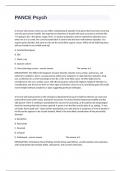PANCE Psych
A 24-year-old woman comes to your office complaining of episodic chest pains that have been occurring
over the past several months. She experiences shortness of breath with each occurrence and feels like
"I'm going to die." She denies cough, fever, or sputum production and has noticed the episodes occur
when she is in a crowd. Her current examination is normal and she feels well between episodes. You
suspect panic disorder, but want to rule out the most likely organic causes. Which of the following tests
will you include in your initial work-up?
A. Arterial blood gases
B. CBC
C. Chest x-ray
D. Sputum culture
E. Urine toxicology screen - correct answer The answer is E.
EXPLANATION: The differential diagnosis of panic disorder includes many cardiac, pulmonary, and
endocrine conditions, but in a young woman without any symptoms or signs between episodes, drug
use, as detected on a urine toxicology screen (E), is the most likely cause. An EKG might also be
considered to rule out a cardiac cause. CBC (B) and sputum culture (D) might be helpful if infection is a
consideration, but she has no fever or other signs of infection. Chest x-ray (C) and blood gases (A) would
not be helpful without symptoms or signs suggesting particular etiologies.
A 55-year-old male presents to the emergency department because he believes that his son may have
poisoned his food earlier today. During the encounter, he shows limited interpersonal ability and has
odd speech. There is nothing to substantiate his concern for poisoning, as the patient ate prepackaged
food this morning that had not been opened. A penny is on the floor and he picks it up, stating, "it was
on heads, that's good luck." Upon further questioning, you note that he is suspicious of a lot of people in
his life and he appears to be socially isolated. What is the most likely classification of this personality
disorder?
A. Borderline
B. Narcissistic
C. Paranoid
D. Schizoid
E. Schizotypal - correct answer The answer is E.
EXPLANATION: Schizotypal clinical findings include being superstitious, socially isolated, and suspicious,
and having limited personality ability, odd speech, and eccentric behaviors.
,Which personality disorder clinical findings include impulsiveness, unstable and intense interpersonal
relationships, lack of self control, suicidal ideations, aggressive behavior, and a high drug abuse rate. -
correct answer Borderline
Which personality disorder presents with the clinical findings of grandiosity, a preoccupation with
power, lacking interest in others, and excessive demands for attention. - correct answer
Narcissistic
Clinical findings of someone who with what personality disorder would include defensiveness, being
overly sensitive, secretive, suspicious, and hyper-alert, and having a limited emotional response. -
correct answer paranoid personality
Clinical findings of what personality disorder consist of being shy, introverted, withdrawn, and avoiding
close relationships. - correct answer schizoid personality disorder
Your patient is a 4-year-old boy whose father brings him to your primary care office concerned about
behavioral problems. He cannot seem to sit still in school. He seems to have a great deal of difficulty
focusing for any length of time. Which of the following is required in order to make the diagnosis of
attention deficit/hyperactivity disorder (ADHD) according to the DSM-IV-TR?
A. He exhibit more symptoms of inattention than hyperactivity
B. He must be at least 10-years-old
C. He behaves aggressively towards others on at least some occasions
D. Some impairment from the symptoms is present in two or more settings
E. Symptoms of inattention be present on a daily basis for 3 months - correct answer
The answer is D.
EXPLANATION: The diagnosis of ADHD requires symptoms of both hyperactivity/impulsivity and of
inattention (D). It does not require more or more prominent symptoms (A) of one or the other.
Aggression (C) is seldom involved, although the impulsivity may manifest as lack of concern for others.
The symptoms must be present before the age of seven (B) and must have been present for at least 6
months (E).
A 58-year-old male comes to your primary care office complaining of sadness, insomnia, loss of appetite,
weight loss, and feelings of guilt or hopelessness for the past month. On further questioning you find
, that his wife of 30 years died of breast cancer shortly before the onset of symptoms. Which of the
following is the most likely diagnosis?
A. Bereavement
B. Dysthymia
C. Depressive episode - correct answer The answer is A.
EXPLANATION: Bereavement (A) is the normal grief response experienced after a significant loss and
includes all the symptoms of depression and, by definition, lasts no longer than two months, although
many will suffer from some symptoms for longer. Dysthymia (B) is a longstanding depressed mood for at
least two years but not meeting the full criteria for a depressive episode (C). Major depression (E)
requires at least one depressive episode, which requires at least five of the symptoms, one of which is
depressed mood (D).
A 24-year-old male has an eight-month history of loose thought associations, social withdrawal, auditory
hallucinations, and deterioration in his personal appearance and hygiene. Upon examination, he is noted
to have a flat affect, perceptual distortions, and behaves like he is detached from his own actions. An
atypical antipsychotic medication is chosen for this patient. Which of the following medications is
classified as an atypical antipsychotic?
A. Chlorpromazine (Thorazine)
B. Haloperidol (Haldol
C. Loxapine (Loxitane)
D. Molindone (Moban)
E. Olanzapine (Zyprexa) - correct answer The answer is E.
EXPLANATION: Olanzapine is the only atypical antipsychotic listed in the given answers. The remainder
of the medications listed are typical antipsychotic medications.
Typical Anti-psych med - correct answer Chlorpromazine (Thorazine)
Haloperidol (Haldol
Loxapine (Loxitane)
Molindone (Moban)
Which of the following medications used in treatment of this disease has the risk of prolonging the QTc
interval?
A. Aripiprazole (Abilify)B. Chlorpromazine (Thorazine)C. Loxapine (Loxitane)D. Quetiapine (Seroquel)E.
Ziprasidone (Geodon) - correct answer The answer is E.




